Disclaimer: As a Chewy and Amazon affiliate, I earn from qualifying purchases. This does not impact our reviews and comparisons.
Are essential oils safe for cats?
For the most part, no they are not safe.
Most essential oils are toxic to cats. This is due to cats having a different metabolism than humans and being more sensitive to exposure.
Cats can suffer a range of problems from exposure to essential oils such as weakness, trembling, respiratory problems, and even death in extreme cases.
I am not a veterinarian and I recommend seeking the advice of a vet for any further questions relating to your cat’s health.
Let’s get into the article.
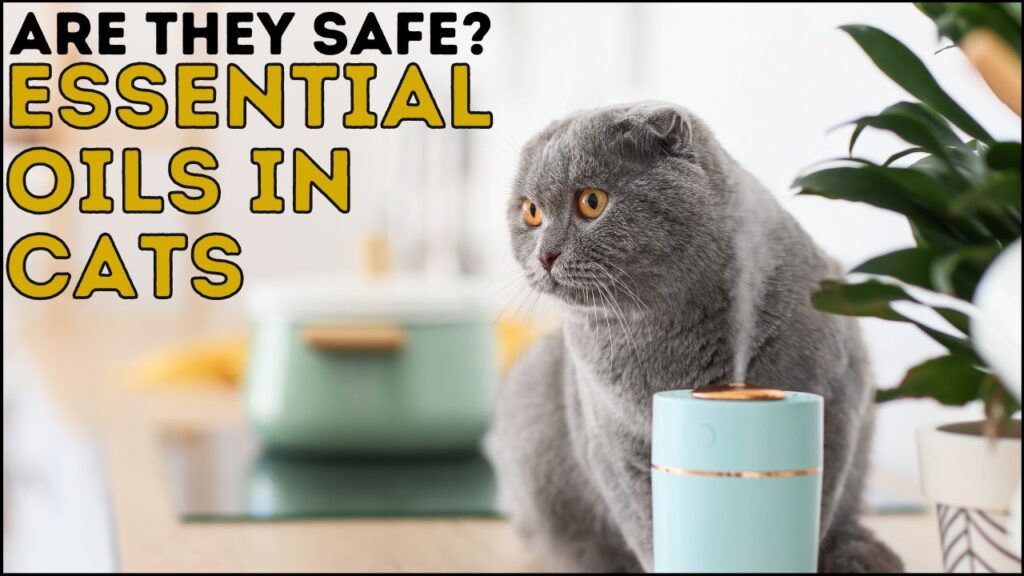
What Are Essential Oils?
Essential oils are fatty liquid substances taken from a wide variety of plants and botanicals.
Distillation or cold pressing methods, extract the aromatic oils from plants.
The secretory parts of many plants contain essential oils.
Aromatherapy is the main use of essential oils, obtained from plant extracts.
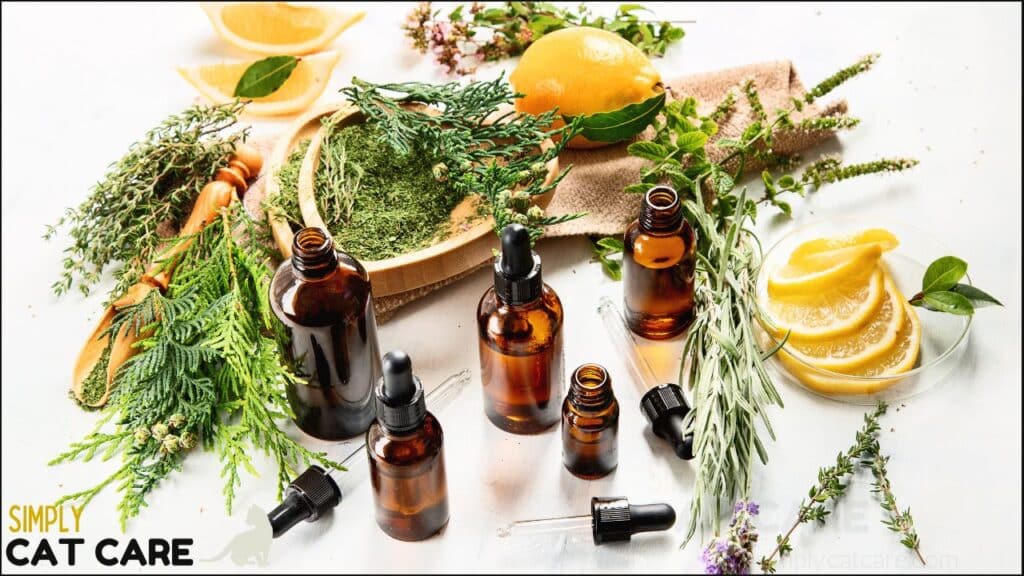
How Many Types of Essential Oils Exist?
There are many essential oils, with at least 300 types on the market.
Popular oils include:
- Wintergreen oil
- Clove oil
- Cinnamon oil
- Pennyroyal oil
- Lavender oil
- Chamomile oil
- Peppermint oil
The list goes on…
The oil is a concentrated form of natural ingredient extracted for use.
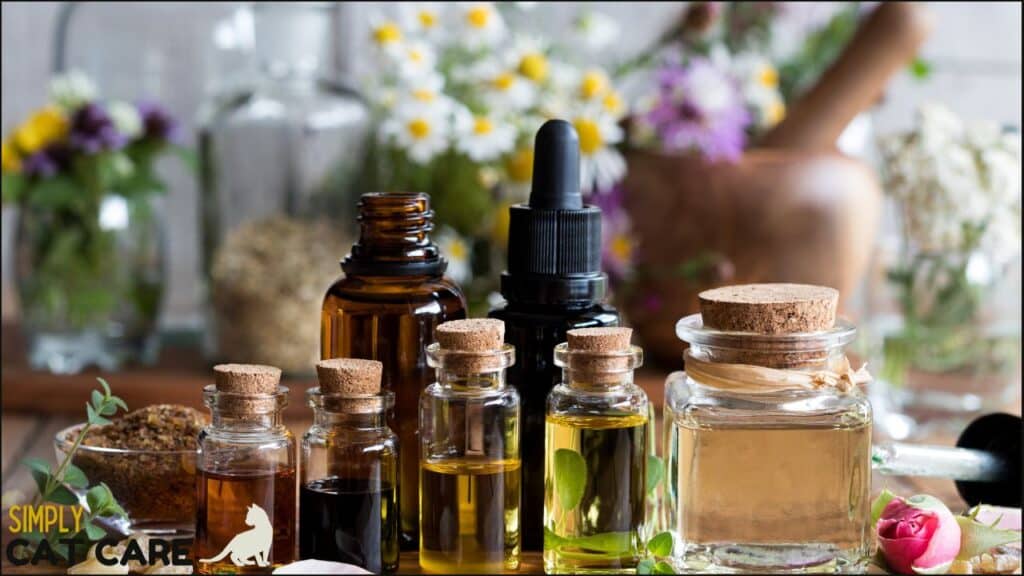
How Are Essential Oils Used?
Essential oils are mainly used for aromatherapy.
Aromatherapy is from inhalation via the following products:
- Liquid potpourri
- Automated sprays
- Diffusers
Essential oils are also applied topically.
The topical application includes:
- Bathing salts
- Oils
- Creams
- Lotions
- Clay masks
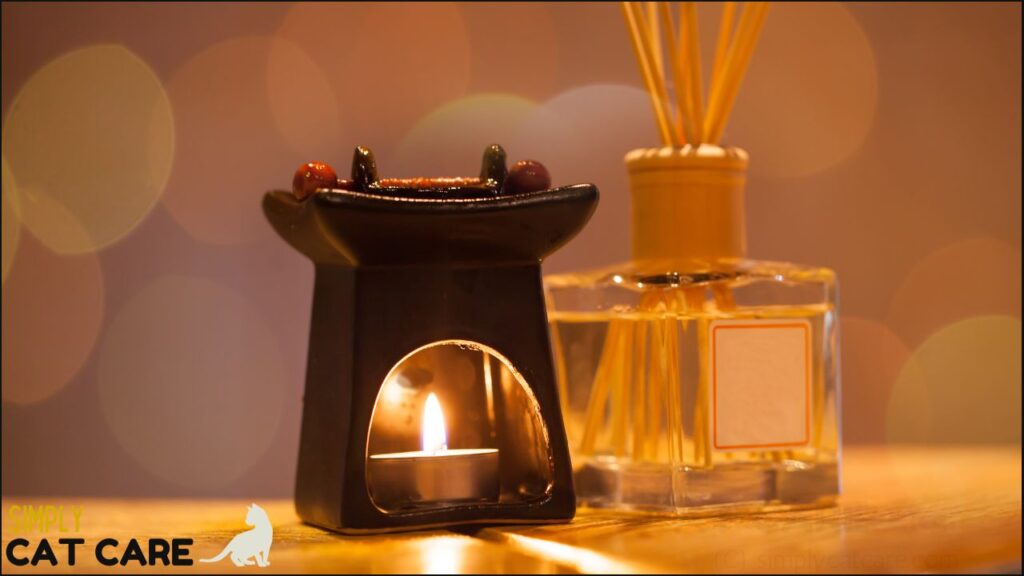
What Health Conditions Do Essential Oils Treat?
People use essential oils to treat a wide range of health problems.
This includes:
- Stress
- Headaches
- Insomnia
- Bacterial infections
The efficacy of essential oils in treating these conditions is generally low and not proven with scientific literature.
Nonetheless, these concentrated herbal remedies form a large part of the alternative medicine market.
Essential oils are also used for flea control.
Related:
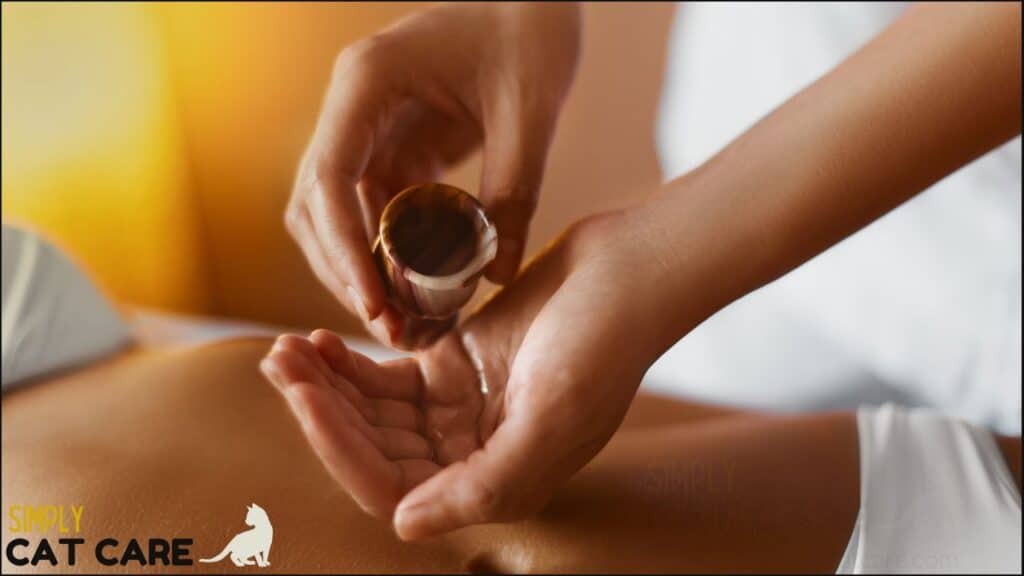
How Are Essential Oils Absorbed?
Essential oils are inhaled (breathed in) or absorbed on the skin.
The bioavailability of the compounds found in essential oils depends on the route of administration.
The pharmacokinetics depend on metabolic barriers, digestive factors, and genotype.
Essential oil molecules absorb into the body via inhalation or through topical application.
Are Essential Oils Toxic in Cats?
Yes, most essential oils are toxic to cats.
Research into topical melaleuca oil on cats found:
- Depression
- Weakness
- Lack of co-ordination
- Muscle tremors
A retrospective study on cats sent to health clinics between 2006 and 2008 found negative effects from essential oil use.
92% of animals presented to clinics with one or more adverse effects when given topical essential oils. Two cats died due to essential oil usage.
Agitation and hypersalivation were common symptoms of essential oil poisoning. Tea tree oil also leads to toxicity in cats and can result in death.
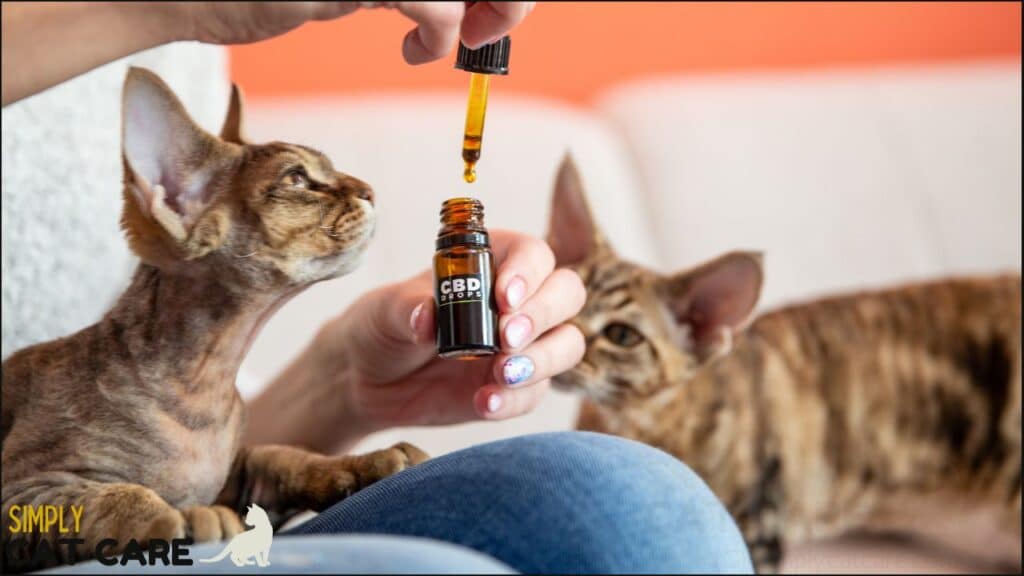
Are There Benefits to Using Essential Oils in Cats?
There are some benefits to a few essential oils for cat health.
A study on 28 cats treated with garlic, marjoram, and ozonated olive oil, found improvement in infection of otodectes cynotis. The dose was 5 drops applied to the facial area.
Another study found benefits to artemisia absinthian extract when orally administered to cats at a dose of 300 mg/kg and 600 mg/kg. Despite these benefits, consult your vet for specific treatments.
There are many approved treatments for conditions such as fleas and worms that have research-based evidence supporting their use. The dose and type of essential oil all affect outcomes.
The higher the concentration of essential oil, the greater the risk to the cat.
Which Essential Oils Are Toxic in Cats?
Most essential oils are toxic to cats.
This is because cats lack the liver enzymes needed to metabolize and eliminate essential oils.
Cats are not able to perform a liver process called glucuronidation. This is a process where the liver adds glyosidic bonds to help with drug excretion.
In basic terms, the liver needs to take chemicals and add/remove things so the body can get rid of them. Cats lack some processes to do this, so the chemicals build up.
As such, cats have a harder time disposing of toxins, especially phenolic compounds.
Since cats groom themselves, the topical application of essential oils results in an oral intake of oils.
Cats are very sensitive to phenols and phenolic compounds, found in a range of essential oils. The attached articles contain a list of toxic oils that cause poisoning in cats.
What Are the Symptoms of Essential Oil Toxicity in Cats?
Symptoms include:
- Drooling
- Vomiting
- Tremors
- Ataxia
- Respiratory problems (difficulty breathing)
- Low heart rate
- Low body temperature
The symptoms involved in essential oil toxicity depend on the type of exposure and oil.
A cat might also start coughing, crouching low with no abdominal movement. This is not normal and requires veterinary assistance.
Cats with respiratory issues such as asthma and airborne allergies are at risk for developing severe respiratory irritation versus cats without such conditions.
Kittens and cats with liver disease are more sensitive to essential oils.
Pet owners should not apply concentrated oils to the skin or fur of the cat, as they groomed and ingest the oils.
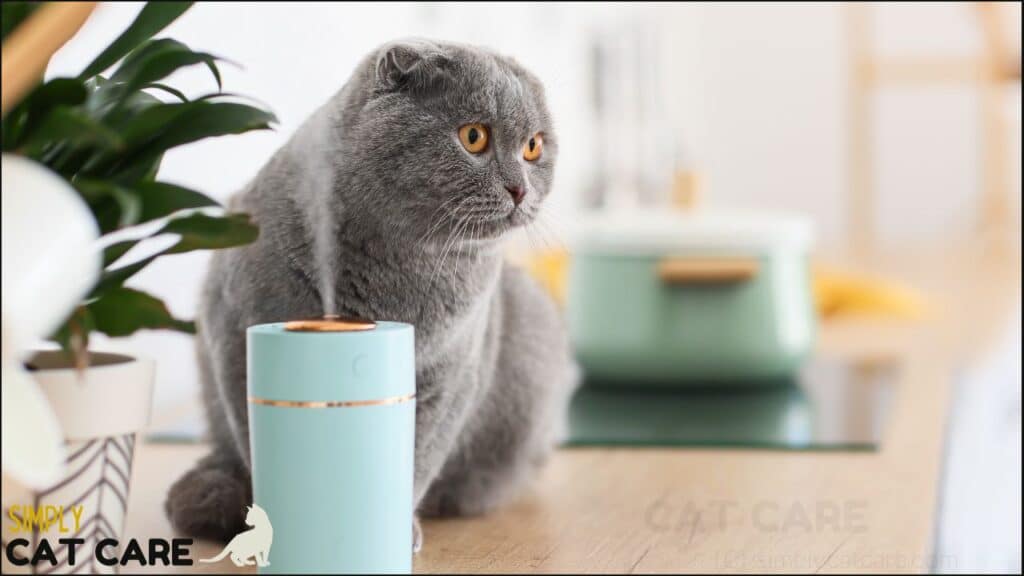
Are Essential Oils Safe for Cats?
No, most essential oils are not safe to use on or around cats.
Since there is a wide range of essential oils, using them around your cat is akin to playing Russian roulette.
The type of essential oil, the dose, and the method of application (topical or inhaled) impact the toxicity of your cat. For logistical reasons (e.g. funding and ethics), there isn’t enough comprehensive data on all toxicity of essential oils.
Using an essential oil as a treatment is not recommended.
If you intend on using an essential oil, avoid using any on your cat. Avoid the essential oils that are unsafe for cats, and ask your vet if you intend to use a diffuser around the house.
Don’t put any oils on the fur or other body parts of your cat.
How Can I Prevent My Cat From Getting Toxic Exposure to Essential Oils?
Never have potpourri or diffuser items in access to cats.
Keep in mind, cats like to jump and access high spaces, don’t assume your cat cannot get to the top of your cupboards, because they can.
Don’t leave these products open. Never apply concentrated oils to your cat.
Seek veterinarian advice before using any essential oils around your cat. Avoid using essential oils on other pets or dogs.
Dogs have a different body from cats. To learn more about essential oils for dogs, check out this awesome guide.
What if I Suspect My Cat Is Poisoned?
Contact the pet poison helpline or an animal poison control center appropriate to your location.
Remember, signs of poisoning include:
- Vomiting
- Respiratory distress (e.g. coughing)
- Sneezing
- Drooling
- Tremors
- Weakness
- Hair loss or lesions that look like burns on the skin (this is most common when an topically applying essential oil on the cat)
A workup can show things like liver damage and other metabolic health problems.
Don’t use essential oils on your cats.
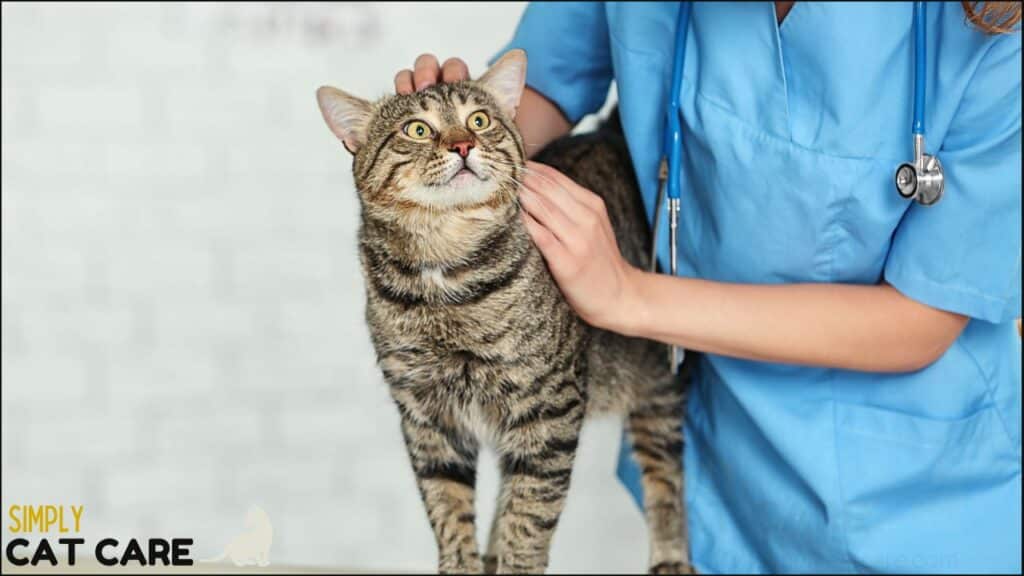
Conclusion
Essential oils are generally not safe for use around cats.
If you are looking for a safe way to use essential oils in your home, it is best not to diffuse them around cats. Cats have very sensitive respiratory systems and the wrong type of essential oil could cause harm.
Some essential oils may benefit cats but you should consult with your vet before use. It is always better to play it safe when using any new product on your pet.
